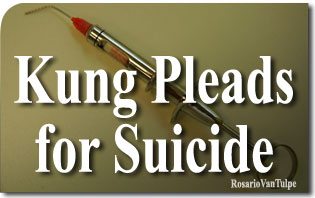 After dedicating his life to developing a “progressivist” theology that justifies the “self-destruction” of the Church and her ominous invasion by the “smoke of Satan” (in the words of Paul VI), Swiss theologian Hans Kung is preparing to appear before God, the Belgian news agency Infocatho reported.
After dedicating his life to developing a “progressivist” theology that justifies the “self-destruction” of the Church and her ominous invasion by the “smoke of Satan” (in the words of Paul VI), Swiss theologian Hans Kung is preparing to appear before God, the Belgian news agency Infocatho reported.
Yet in Kung’s theology, adopted by many architects of the “post-conciliar” era, this transcendental passage has no major importance. Hell does not exist, God does not punish, nor is there any sin except that in existing social inequalities and “alienation” in the Church. He is a great preacher against so-called “alienation” and inequality.
However, death comes for everyone and theologian Kung is terminally ill in hospital. He has just managed to overcome a clinical phase that seemed to be the end.
Given this inescapable perspective, he has written a book that is scheduled to appear under the title, Dying Happy?
In the afterword, he reaffirms his support of the false “right to choose death” and of iniquitous “assisted suicide,” condemned by God’s Commandment “Thou shalt not kill.”
Hans Kung is 86 and suffers from Parkinson’s disease. “No one should endure an unbearable suffering as if it were sent by God,” he writes in his last book.
However, that is precisely what Our Lord Jesus Christ did by suffering the unspeakable pains of His Passion in order to redeem us, having accepted on the height of Golgotha all the pains that God the Father sent Him. That is also what legions of saints and followers of Christ have done.
Can a disciple be more than his Master and not follow His divine example by suffering what God sends?
For Hans Kung, we are all equal and there is neither master nor disciple. It is the people that decide democratically. And Kung suggests he has a right to choose suicide.
The theologian of revolution in the Church has also argued, on other occasions, that every one has before God the right to decide about his own life or death, as if the supreme will of the Creator and Supreme Judge of life and death should not be obeyed.

